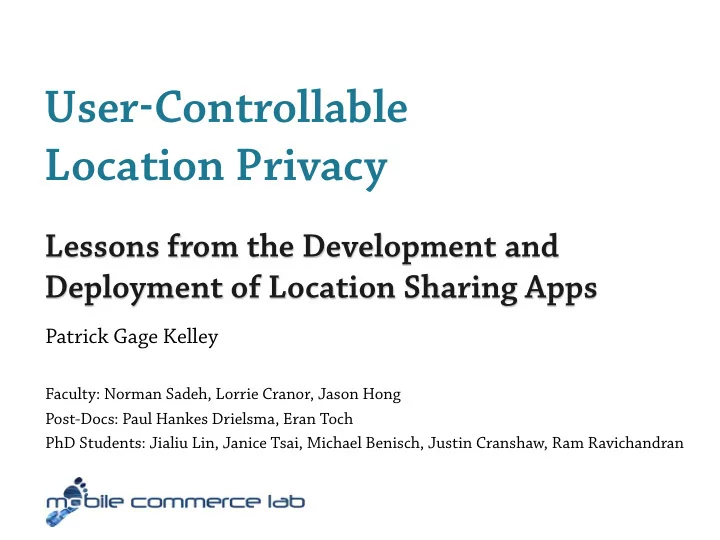

User ‐ Controllable Location Privacy Lessons from the Development and Deployment of Location Sharing Apps Patrick Gage Kelley Faculty: Norman Sadeh, Lorrie Cranor, Jason Hong Post-Docs: Paul Hankes Drielsma, Eran Toch PhD Students: Jialiu Lin, Janice Tsai, Michael Benisch, Justin Cranshaw, Ram Ravichandran
User-Controllable Security & Privacy ! Users are increasingly expected to set up security and privacy policies: ! Home computer ! Flatter, more agile organizations ! Social networks ! Yet, we know that they have great di ffi culty doing so ! Potential vulnerabilities ! Can we develop solutions that help them?
Mobile Social Networking Apps As a Case Study ! Desire to share data with others ! Mitigated by privacy concerns ! Location sharing as a “hot” application ! Tens of apps over the past several years ! …but adoption has been slow
Location Sharing Technologies
LOCACCINO ! Gives us access to detailed usage data ! Allows us to experiment with di ff erent technologies ! Several thousand downloads over the past year ! Departs from commercial apps: ! More expressive privacy settings ! Auditing functionality ! New technologies (e.g. UCPL) ! Available on Android Market and Nokia Ovi store
Ongoing Work ! Canonical default policies can help reduce user burden ! Designing expressive security and privacy policies ! Explains in part the slow adoption of today’s location sharing apps ! User Controllable Policy Learning o ff ers the promise of reconciling the benefits of machine learning with the need for users to remain in charge ! Nudging Users towards safer practices
Can You Find a Default Policy? ! Location sharing with members of the campus community – 30 di ff erent users Green: Share Red: Don’t
Methodology for Designing Expressive Policies ! Collect ground truth preferences for a representative sample of the user populations ! For di ff erent levels of expressiveness, compute the expected e ffi ciency of the policies users would be able to define ! Assume rational users ! Search algorithm to identify optimal policies ! Select among di ff erent levels and types of expressiveness based on the above
Types of Restrictions ! Friends Only (49.4%) ! Granularity (11.2%) ! Blacklist (15.7%) ! Invisible (33.7%) % of applications !"#$%&'($%)*&+,-.$/"&$01&2*/3,-4"&#$%5,$45,"&&&&&&& 9
Privacy Controls ! Best mitigate the greatest expected risks – Blacklist (16%) – Granularity (12%) – Group-based rules (12%) – Location-based rules (1%) – Time-based rules (1%) % of applications !"#$%&'($%)*&+,-.$/"&$01&2*/3,-4"&#$%5,$45,"&&&&&&& 10
Average Time Shared with Various Groups, Determined by Settings
User-Controlled Policy Learning (patent pending) ! Learning traditionally configured as a “black box” technology ! Users are unlikely to understand the policies they end up with ! Major source of vulnerability ! Can we develop technology that incrementally suggests policy changes to users? ! Tradeo ff between rapid convergence and maintaining policies that users can relate to
User-Controlled Policy Learning (patent pending)
Future Work ! Nudging Users towards safer practices ! “Soft paternalism” ! Can we provide users with feedback that nudges them towards safer practices ! Can we identify default policies that are biased towards safer practices? ! How do users respond to this in practice? ! Joint work with Alessandro Acquisti and Lorrie Cranor
Expressiveness in Location Sharing ! Users have complex privacy preferences ! Simple “white list” approaches only capture a small fraction of scenarios ! Application becomes less useful : users err on the safe side -> little sharing ! Time and location are important attributes ! Other attributes still to be quantified ! Default policies are not easy to find but can help
Q&A Research funded by the US National Science Foundation, the US Army Research O ffi ce, CMU CyLab, Microsoft, Google, Nokia, FranceTelecom, and ICTI T e User-Controllable Privacy Platform on top of which Locaccino is built is now commercialized by Zipano Technologies.
Selection of References ! Norman Sadeh, Jason Hong, Lorrie Cranor, Ian Fette, Patrick Kelley, Madhu Prabaker, and Jinghai Rao. Understanding and Capturing People’s Privacy Policies in a Mobile Social Networking Application Journal of Personal and Ubiquitous Computing 2008. ! Ramprasad Ravichandran, Michael Benisch, Patrick Gage Kelley, and Norman M. Sadeh. Capturing Social Networking Privacy Preferences: Can Default Policies Help Alleviate Tradeo ff s between Expressiveness and User Burden? PETS ’09. ! Janice Tsai, Patrick Kelley, Paul Hankes Drielsma, Lorrie Cranor, Jason Hong, and Norman Sadeh. Who’s Viewed You? T e Impact of Feedback in a Mobile-location System. CHI ’09. ! Patrick Kelley, Paul Hankes Drielsma, Norman Sadeh, Lorrie Cranor. User Controllable Learning of Security and Privacy Policies. AISec 2008. ! Michael Benisch, Patrick Gage Kelley, Norman Sadeh, Tuomas Sandholm, Lorrie Faith Cranor, Paul Hankes Drielsma, Janice Tsai. T e Impact of Expressiveness on the E ff ectiveness of Privacy Mechanisms for Location Sharing. CMU-ISR Tech Report 08-141. ! Jason Cornwell, Ian Fette, Gary Hsieh, Madhu Prabaker, Jinghai Rao, Karen Tang, Kami Vaniea, Lujo Bauer, Lorrie Cranor, Jason Hong, Bruce McLaren, Mike Reiter, and Norman Sadeh. User- Controllable Security and Privacy for Pervasive Computing. T e 8th IEEE Workshop on Mobile Computing Systems and Applications (HotMobile 2007). 2007. ! Norman Sadeh, Fabien Gandon and Oh Buyng Kwon. Ambient Intelligence: T e MyCampus Experience School of Computer Science, Carnegie Mellon University, Technical Report CMU- ISRI-05-123, July 2005.
Patrick Gage Kelley patrickgage.com me@patrickgage.com twitter.com/patrickgage with Lucian Cesca, Joanna Bresee, and Lorrie Faith Cranor Acknowledgments: Janice Tsai, Sungjoon Steve Won, Robert Reeder, Aleecia McDonald, Daniel Rhim, Steve Sheng, PK, Robert McGuire, http://cups.cs.cmu.edu Cristian Bravo-Lillo, Norman Sadeh, Clare-Marie Karat 35 !"#$%&'($%)*&+,-.$/"&$01&2*/3,-4"&#$%5,$45,"&&&&&&&&&&&&&&6789::/38(;/(;/<3;*13:&
Recommend
More recommend